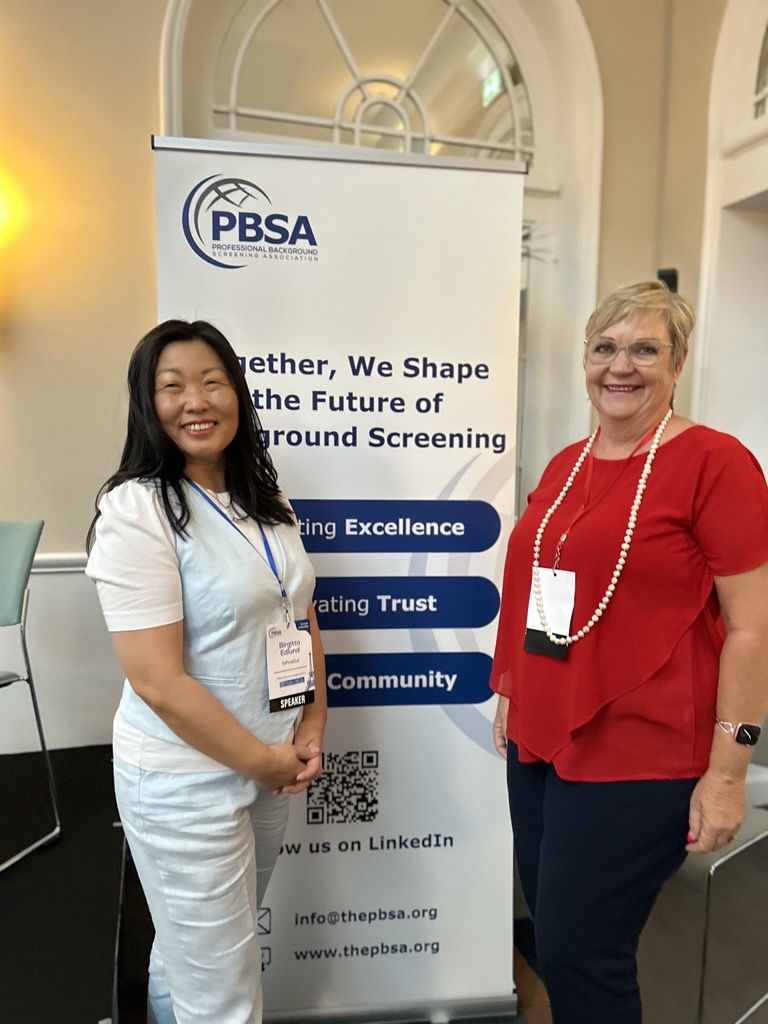When we met Jenny Reid, founder of iFacts and expert on background checks in Africa, one thing became clear: where systems are missing, people step in – and that reality might just change the way we think about hiring in Europe too.
In Sweden, we take it for granted. A personal identity number is enough to tie together an entire life story – from preschool to the latest credit check. A background check is simply a matter of system access. Click, done. But what happens when the systems aren’t there? When no one can guarantee that a register even exists?
Jenny Reid, founder of iFacts and one of Africa’s most experienced background screening experts, raised exactly that question on stage at the PBSA Europe Summit. In Africa, this isn’t an exception – it’s the reality.
In many African countries, the majority of the population works in what’s known as the informal economy. That means: no employment contracts, no digital footprint, no formal ID. A workforce built on trust – not paperwork. And when you can’t verify through systems, you must instead verify through people. This is where Reid’s method stands out. She talks about community-based verification: visiting the candidate in their village, calling the priest, the teacher, or the neighbors. And about realizing that sometimes, a piece of paper doesn’t say more than a person can.
“One of the most common misconceptions among European companies is that background checks in Africa can be conducted the same way as in Europe. Many assume the entire continent has the same infrastructure and data quality as European countries,” says Jenny Reid.
In reality, it looks very different. Africa is made up of many countries with diverse laws on privacy, data protection, and labor rights. Access to reliable sources varies greatly – and cultural differences also shape how education, employment history, and references are documented.
“Relying solely on European standards without adapting to regional realities risks incomplete checks, mis-hires of unqualified or unscrupulous individuals, and ultimately reputational and operational damage,” Reid explains.
Where Sweden relies on its registers, much of Africa must rely on relationships. And that takes more than a CRM system. It requires cultural sensitivity, the courage to trust soft values – and the willingness to ask questions beyond ‘what does the police record say?’
What methods do you use to verify a candidate’s background?
“Understanding the local context is absolutely critical. We use a variety of methods depending on the country and the situation,” says Jenny Reid:
- Local references: In many African communities, personal reputation and social standing are highly valued. We speak with community leaders, elders, or respected local figures. Reputation often weighs more than documents.
- Social media and digital footprints: With social media spreading rapidly across Africa, some organisations review candidates’ online presence – not just for social skills, but to assess integrity, community involvement, and any red flags. It’s a cost-effective, quick way to gather more context.
- On-site visits: In remote or hard-to-reach areas, we may visit a candidate’s home or workplace to verify employment history, residence, or personal claims, while also speaking informally with neighbors or colleagues.
- Religious or cultural institutions: Churches, mosques, or cultural associations sometimes hold valuable records of education or community involvement – particularly when official documentation is missing or unreliable.
- Mobile payments and transaction history: In regions with limited traditional banking infrastructure, mobile money platforms play a crucial role. Verification experts have worked with mobile payment providers to assess candidates’ financial stability – an indirect but powerful indicator of reliability and lifestyle.
“It’s about adapting to each environment and daring to think beyond the traditional European methods,” says Reid.

Birgitta Edlund and Jenny Reid at PBSA Summit in Paris.
But this isn’t just a challenge for Africa. Even in Europe, the number of temporary contracts, gig jobs, parallel identities, and undocumented life paths is growing.
“African practices highlight the importance of understanding local legal, cultural, and infrastructural realities – beyond the information that’s physically available,” Reid points out.
“European employers operating in Africa or similarly complex environments need to integrate this knowledge into their checks to ensure compliance, effectiveness, and cultural sensitivity.” So the next time you think of background checks as just an administrative routine – ask yourself: what do you do when the routine doesn’t exist?”
We are facing a new reality where labor markets are changing faster than systems can keep up. Those who fail to adapt their verification methods risk falling behind – those who dare to think differently will stay ahead.




